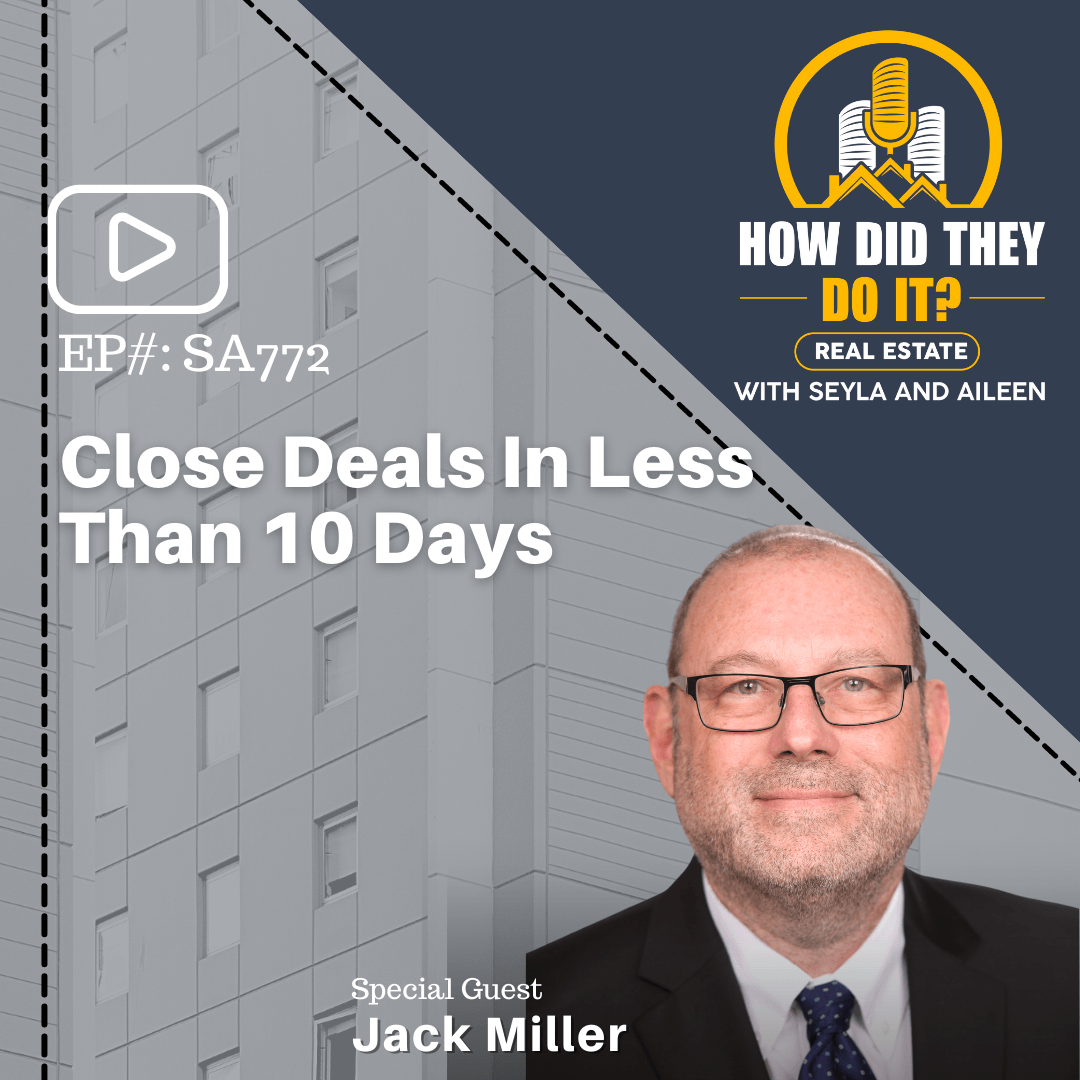Marcy and Jack talk a little bit about the increasing interest rate environment and what it means for commercial mortgage brokers and borrowers, and how to take advantage of it.
“Marcy: Hi.
Jack: Okay, here we go.
Marcy: We’re working now. Hi, good morning.
Jack: Good morning. We’re making this. I want to give the date because we’re making this on May 6th, Friday. Anyway, we wanted to make this video to cover a few topics. You know, when COVID first hit, we made a video about how we deal with COVID, and it was very, very successful. Got a lot of good feedback from mortgage brokers.
Marcy: Right, because it was completely the unknown, and we didn’t— no one knew what was going to happen during that time. But yet business did go on.
Jack: Business went on. We were very busy, but a lot of people shut down. A lot of people shut down. It was actually going for us. But we wanted to make it to deal with the Federal Reserve increasing rates. I think they increased them Wednesday, if I’m not mistaken, by 50 basis points. I think a month or so before that, they increased them a quarter. The Fed chairman, if I heard right, I believe he said they’re poised to increase basis points for the next two meetings. So, it appears that, you know, in total, rates are going to go up 175—They’ve already gone up 75 basis points, another 100 basis points. That’s going to be a shock to the market. You know, and it dawned on me the other day that most of the people probably watching this are in the business today, haven’t survived and haven’t lived through increasing rates.
Marcy: Right, where we started, we started high and went down.
Jack: That’s correct.
Marcy: Now where we would hit rock, it was down here, and now it’s starting to go this way.
Jack: As well, we haven’t had inflation in this country in decades. Most people haven’t experienced that. So, we wanted to make a little video just to address these issues. So, let’s just jump into it. So, Marcy, from my perspective, you know, any time there’s a market turbulence like COVID or interest rates, you know, there’s, of course, pauses in the market, deals have…
Marcy: There’s going to be restructuring.
Jack: Restructuring, deals have to be repriced. You know, if someone was paying a million dollars for a deal when rates weren’t moving, if rates go up 100…
Marcy: Is it really worth that now? That’s…
Jack: 175 basis points, it may be worth 900 grand.
Marcy: Right. The sellers are gonna have to take that into consideration.
Jack: So, there’s usually a restructuring, but it also dawned on me, as I’ve been looking at my LinkedIn feed and Twitter feed, that some people are literally panicked over this.
Marcy: I don’t think there’s any reason to panic. It’s a natural progression.
Jack: Yeah, but people haven’t lived through it. And what’s happened is deals have been priced to perfection. And, you know, when rates go up, it’s not perfection. And when you price things at very skinny cap rates, 25 basis points, 50 basis points, 175 basis points make a huge difference. So, I think what will happen is there’ll be a weeding out of some brokers, to be honest with you. And we’re…
Marcy: Brokers and lenders, yeah, they’re gonna… It’s gonna take a toll. I mean, there’s going to be…
Jack: We’ve had in the past, I’m going to say 10 days or so, and I don’t know the number, but there have been, I’m going to say a half dozen to a dozen deals that have come to us that have been rejected, supposedly rejected, and a lot of the reason is because they didn’t have interest rate protection.
Marcy: And the rate kept going up.
Jack: The rate kept going up. And if they would have closed those deals, they—anyway, it dawned on me that they didn’t have interest rate protection, and you’re gonna see more of this. But on the other hand, we’re a balance sheet lender. We don’t sell our loans to Wall Street, so for us, you know, we’re not… It doesn’t matter. But I think that brokers have to use this period to readjust, to readjust. Again, there will be some fallout, but there’ll be, whenever there’s fallout, there’s sometimes good things that happen. You know, I always use the example, and it’s really a terrible example, that you know, if an old lady falls down the step, she breaks her hip. No, it’s terrible. It’s terrible for her. It’s terrible for her family. But an ambulance driver comes, picks her up, he’s making money. Okay, they’re taken to the hospital, they’re making money. They’re taking her to a rehab, they’re making money. The doctors are making… Everyone’s making
money on this poor old lady. And that’s effectively what you need to do in the mortgage and real estate business. You need to position yourself to be on the flip side in any…
Marcy: Like, let’s give the brokers some examples of where they can flip themselves to maybe take advantage of what’s going to be happening in the market. What could they do? They could try to focus on foreclosures, maybe pre-foreclosure—like, where can we direct the brokers to go because of this market?
Jack: I think the number one thing… We’ll get to specifics. Okay, I think the number one thing is don’t give up, don’t get out of the business. You know, so many people…
Marcy: You got to roll with it.
Jack: Yeah, so many people, when their pipeline dries out, when it’s hard to get deals, they give up and they abandon the business. And I think that’s, that’s a mistake. I think you need to stick with it. But to Marcy’s point, some people will give up and get out of the business. There may be less competition. And I think you need to use this point to refocus on, as exactly what Marcy said. If we start seeing an increase in foreclosures, to a certain degree, the Federal Reserve has masked it by working with borrowers, which I view is a good thing, not a bad thing. Foreclosures, judgment search, look at Lis pendens.
Marcy: Right. I mean, I will tell you that we have seen a lot in the past, I’m going to say six weeks to two months, a lot of pre-foreclosures. I mean, so what the borrowers are finding themselves in situations where they have never been in before because their tenants were paying them rent, and then through COVID, they didn’t pay. Everyone was slow, you know. It all trickled down to the bottom, and now they’re like in this situation where they got behind on their payments, and no one wants to lend to them because they were behind on their payments, and it’s kind of a catch-22. So, we have seen a lot of deals. I mean, so much more since I’ve been in the commercial business of pre-foreclosures of people that have never been in this situation and honestly don’t know what to do. And that’s where we shine. I mean, that’s what we do. We help people get out of situations that have been created because of what’s going on in the world right now.
Jack: Can I add a little bit?
Marcy: Sure.
Jack: Because we do foreclosure bailouts, and we are collateral-based lenders. We look primarily at the collateral. It doesn’t mean we ignore the borrower, but we’re also risk-based pricing. So, in other words, if someone comes to us and they’re in foreclosure and they’ve had a lot of credit problems, there’s a certain risk with that, and we’re going to price it accordingly. And if you have someone who comes to us, for example, who is a bank-quality loan, they just need a quick close, we’re going to price that accordingly.
Marcy: Right. I mean, that’s one thing that I had a lot of brokers come to me, and then I soft quote the deal, you know, just because this is a reality of what’s going on. And then they bring it to the borrower, and a lot of these borrowers are not…are very shocked by the fees and the rates because they’re not used to this type of lending because they’ve never been in this situation before. So, I’m reaching out. I wanted to discuss this with the brokers that I think that you need to get to know your borrower better and really understand what they’re looking for because a lot of people that we’ve been dealing with lately are borrowers that don’t understand the risk that we’re taking to lend them the money and their situation.
Jack: Can I add something to that?
Marcy: Sure.
Jack: I think you bring up a very good point. Not only do the brokers need to know the borrowers better, which we’ve made a bunch of videos on…
Marcy: Can’t emphasize that enough.
Jack: But they need to get to know the lenders and what we are. In other words, you don’t go to a McDonald’s and order a pizza. So, we are at Gelt. We’re basically short-term bridge lenders. And when I say short-term, I mean it could be from a month to five years. We’re not permanent lenders. People are usually coming to us because either they don’t have time to go to a bank or they can’t go to a bank. So, we’re more expensive, you know? And…
Marcy: And it’s like that’s not a bad thing. We’re just… I want you to understand why we’re more expensive.
Jack: We’ve built a niche in the market for 33 years now.
Marcy: Absolutely.
Jack: But so, you have to know your lenders. You know, certain borrowers… You know, we started to talk, we’re going to get back into what brokers can do. But back to pricing, know the lenders and know the borrowers and try to make a match between them, right? Because if you have a borrower who’s expecting, let’s say, they’re in foreclosure, and bank rates are 7% or 6%, and they’re expecting 8%, they’re not a good match for Gelt. That’s just not what we are. And if they’re expecting no fees or whatever, that’s not a good match. So, everyone has… You have to really learn…
Marcy: Right. So, brokers, I ask you to, like, know what your borrower expects and what they need. It’s just… It’s like crazy because, like, I’ll price a deal, and then they… I soft quoted, and the broker’s like, “Oh, yes, definitely.” And then when the borrower gets the term sheet, they’re like, “What? There’s this, there’s that.” And I’m like, it wasted everyone’s time.
Jack: Marcy, so much I want to talk about with you because you’re bringing up so much. So, the brokers, the number one lesson is not only know your borrowers but give them the proper expectations. So many times, brokers are trying to sell a deal, so they really overpromise and underdeliver a borrower…
Marcy: Which doesn’t help anyone.
Jack: That’s usually a mistake. It’s a time waste. Remember, you’re only paid at closing, so you want to… You want to sell them properly and know your lenders, so you know what’s happening. Now, I’m going to give you a couple examples of what we’re working on. When I say we’re working, she’s working. She does all the work on DNL. I don’t want to give out too much for confidentiality reasons, but it’s in Brooklyn. It’s actually three properties. We approved the deal before COVID, so two years ago, three years ago… Three years ago, it got to the table, and the borrower didn’t close because he thought we were too expensive. So, what happens? He’s still in foreclosure. The lender is charging him a default rate. He hasn’t paid his real estate taxes, which are now up to, I think, over a hundred thousand. I think, I don’t know what the city of New York is charging on delinquent taxes, but I’m guessing 18-20% interest. It’s a mess. And now they come back three years later. God willing, we’re going to close the deal next week and help them out. But this is a perfect case. It would have been so much cheaper for this borrower…
Marcy: …if he closed the loan three years ago. We could have cleaned everything up for him, and he could have went on with his life, you know? And this was a person that was like being very foolish about spending the extra money to get our loan, but in the long run, it costs him so much more money.
Jack: I’m guessing, I didn’t do the math, but I’m guessing hundreds of thousands of dollars or more. And this example happens, I don’t want to say every day at Gelt, but every other day, all the time. A borrower isn’t… It doesn’t have the proper expectations. He says, “Oh, a bank is charging 5%. You know, I’m in foreclosure, so I’ll pay 6%.” But that’s not the real world. So, in that case, the original broker, I don’t want to criticize him, but there was a mismatch. So, I think the number one, the first thing is…
Marcy: …and in a sense, what Jack was saying, like three years ago, there’s only so much that I can do to get the borrower to proceed with the deal. So, in that situation, it was the broker that didn’t do their… They didn’t do their job. I mean, I’m not calling anyone out, but if they would have done their job, they would have really explained to the borrower, “This is reality. This is what’s going on,” and it didn’t happen.
Jack: Number one thing, stay in business, don’t give up. Number two, learn. Use this period to learn your lenders better, learn what deals they’re looking for, and we love when brokers call us and grill us down, say, “What kind of deals are you looking for? What don’t you like? What don’t you love? What don’t you like? What do you like? What’s your sweet spot? Where can you push it? Really get in and learn lenders, get to know the borrowers, get to know their goals and needs, set their expectations properly, set their…
Marcy: …And if they can— always remember, I mean, there’s always the saying we all grew up with “the grass is not necessarily green on the other side. If you water your grass, it will become green.” My point is that we offer a type of loan that’s going to solve your problem. So, the grass isn’t always greener somewhere else like you think. I mean, everything that we say we’re going to do, guess what? We do it. And I can sit here and say that anyone that knows me in the world, you only get honesty from Jack and me, and that’s it. So, for me, if you… I’m going to be surprised. I’ll come back in about two months and tell you all those couple of deals that came my way, and they didn’t like our fees and they’re all in pre-foreclosure. I wonder how many are going to circle back around to us.
Jack: A lot of them wind up losing the property.
Marcy: You want to lose your property, or you want to, like, get saved?
Jack: It’s sad. It happens all the time. So, another thing that brokers and borrowers can do is reset their pricing expectations to the current interest rate environment. You know, reset your cap rates, reset the value. So, if a cap rate was 5% before, you know, it’s higher now, maybe 6%, 6.5%…
Marcy: Right, because of the rates because everything is in balance.
Jack: That’s right, because of the interest rates. If a property was valued at a million dollars before…
Marcy: …It could be 800 now.
Jack: …who knows? So, borrowers and brokers don’t, because—and really sellers too, sometimes sellers become very emotional, you know? I spoke to someone the other day. We’re actually working on a deal, and—
So, I spoke to a borrower the other day who is selling his building, and he was… He’s having problems selling it, and I said, “Well, what are you asking?” And he tells me what he’s asking. I said, “Well, how did you get to that number?” And he said he literally needs 2.7 million dollars to pay off the first. We’re actually a mezzanine of 1.6. And then he said he needs a million too for, to cash out, to pay off some credit card debt and to live on.
Marcy: …I don’t know if there’s enough in there, Jack.
Jack: I said to the guy, I’m not going to use his real name, I’m just going to say Bill. I said, “Bill, what your credit card debt is and what you need to live on has nothing to do with the value of the property. You are not selling it because it’s not priced right.” So, a lot of times, sellers and buyers, they price up based on what they need, but what they need has not been the market. Has nothing to do with the market. So, you as a mortgage broker or as a borrower or as an investor as a seller have to get in touch with reality. The market always speaks. So, that’s another important thing, sharpen up your tools, you know? Go through your website, go through your forms, and make sure that you’re as educated as possible, make sure you’re as crisp as possible, make sure…
Marcy: Because the more you know as a broker, and you can help your clients because if you’re sharp enough to, like, if they bring you a property, they need to refinance it. Are they looking to purchase it? You do your due diligence to figure out, well, is that priced correctly? If not, then there’s an issue right from the very beginning.
Jack: Another good point, but we don’t… We don’t practice this at all. This is sort of coming to us. How often, Marcy, do we see a value on a property, a mortgage broker cop on a refinance, and they’ll say the value is a million dollars?
Marcy: And I don’t agree with it sometimes times.
Jack: We say, well, how did you get to that number, and they really just don’t know.
Marcy: They don’t know. They took it from the borrower.
Jack: Brokers really need to learn values, and we made other videos on values. I’m not going to go into it now, but what you should do is figure out the NOI, the net operating income. Figure out a market cap, and it’s very… There’s a value. Take the emotion out of it. The value is not what the borrower tells you it is. The value is what’s an arms-length transaction. A ready, willing, and able borrower will pay for it. So, what the owner thinks is the value has no correlation to what the value is.
Marcy: The market speaks. That’s it. The market is just the way it is.
Jack: So I would encourage brokers to sharpen up your tools, to be the best that you can be, to be an expert in your field. Again, we’ve talked about before, if you want to specialize in everything, that’s fine, but there’s certain brokers who, for example, specialize in gas stations or hospitalities or multi-family or debt—
Marcy: Mixed-use. It’s a big thing because not a lot of lenders do mixed-use. We do, but we do.
Jack: Yeah, but so sharpen up. Use this period to sharpen up you, the best investment you can make is in yourself. Is in yourself. And your knowledge. Learn, read, watch. And it’s so easy today to learn and read and get stuff. Just go on YouTube.
Marcy: You can listen to us, and we’ll teach you.
Jack: That’s correct. Okay, so we went over. I think we touched a lot of stuff on. Did we leave anything out?
Marcy: The only thing is if we can maybe give the brokers some tips of trying to figure out how to navigate through this market.
Jack: I’m drinking water. Can I just tell you something?
Marcy: Sure.
Jack: So, I’m drinking a lot of water. So, I noticed like this week, my mouth’s always dry. I’m drinking water. So, of course, I tell my wife, she Googles dry mouth. It’s like right away, I’m dying. I’m about to have a stroke, a heart attack, cancer, whatever it is. So, I realized that I changed. I have some stomach problems. The doctor changed the medicine. So, I call the doctor. He goes, “Oh, it’s the medicine that gave the dry mouth.” So, you know…
Marcy: Well, that’s an example. One thing happens. It happens then another thing happens.
Jack: Yes. That’s why I’m drinking water. I’m sorry. I’m diverted because I’m drinking water.
Marcy: Rates are going up. The market’s going to change because of it, but you’re going to survive, and…
Jack: You’re not only going to survive, I have to tell you something that I predict, and I’ve been telling everyone in this office. We are going to thrive, and I think you’re going to thrive in a turbulent market. You know, when everything is efficient, and the cap rates… When rates are going down, and nothing’s changing, and the cap rates are…
Marcy: Everyone feels settled.
Jack: Everyone feels settled. Everyone’s a hero, but the truth is when the market’s unsettled, when there’s a disruption in the market, there’s a tremendous amount of opportunity. I feel bad saying it because a lot of people… There’s always winners or losers, and there’s going to be winners and losers in this market, but you have to position yourself to be a winner, not a loser. And you have to ask yourself whether you’re an investor or a broker, how do you become that winner in this market? Because markets are changing, and I’m telling you, I laugh when I read… Well, I was looking at Twitter the other night and LinkedIn. Oh, I’m sorry, some people are so panicked out by it. But this is just normal times. What’s going on the past 10 years has not been normal. So, if you want to survive in this business, you have to get used to rates going up, rates coming down, all kinds of things. Prices are going to come down. You’re going to see market compression, but that’s an opportunity for you to gather deals, to gather more market share. So, I view this as a tremendous opportunity, but you have to take advantage of that opportunity. You know, don’t…
Marcy: Take advantage, knowledge. You know, look around what’s going on. You know, look at the cities where there’s the most… I mean, I’m telling you, those pre-foreclosures, there’s some deals made out there for those. I’m telling you.
Jack: Again, and today, let’s talk about that for a little bit. It’s so easy. You could sit in your..
Marcy: house…
Jack: Your house, you know,
Marcy: And you could just google that.
Jack: Yeah, and you check Lis Pendens, check judgments. All of this information is public and market to them. And again, we’re doing pre… We’re doing foreclosure bailouts. We do sale-lease backs. We do all kinds of really complicated matters. We do bankruptcy. We do debt and possession. We do exit…
Marcy: And then, of course, which has been really hot, is that we do, you know, we do a lot of fallout loans. And when I say fallout, and we talked about this in another video, it gets to another lender, and the lender doesn’t fund it. Then that whole package comes to me, and we can get it closed within two weeks, sometimes two weeks, days.
Jack: Days, two weeks is long.
Marcy: Again, if we like the deal, you know, we look at each deal individually and we decide, you know, if we’re going to pursue it or not. But you know what? If you have a deal, don’t panic. You know, show it, run it by Jack and me, and we’ll take a look at it, and we’ll give you an answer within usually an hour, you know, whether we want to do it or we don’t want to do it. And then if we want to do it, then we could just move as fast as the borrower moves.
Jack: Okay, let’s close this up, all right? Okay, so here’s what you get with Gelt Financial. First of all, remember, oh, like the YouTube, hit the bell with a buzz button or what’s it called? Bell or buzzer. So you get more, leave comments, we answer your comments. Check us out at geltfinancial.com. Remember, we’re direct lenders. We keep our loans on the books. We’re not subject to the whims of Wall Street. You’re always going to speak to a decision-maker here. 90 percent of the time, we’re going to let you know within 30-60 seconds whether we like the deal or we don’t like the deal, and we’ll probably give you pricing right on the very first call. Some people, to be honest, they get upset by that. I’ve had many a broker saying, “Well, how come you’re saying no so fast?” And I said, “Look, you’re going to drag it out and talk to you for 20 minutes and then tell you no.” Because we know what we like. We’ve been doing it 32, 33, 34 years.
Marcy: We’re almost 34.
Jack: It’s crazy. So, oh, we’re direct lenders. You’re always going to speak to a decision-maker. We’re flexible. We’re looking at the collateral. You know, if you don’t have a bank statement or you don’t have a tax return, you don’t have something to work with, we’ll work with you. We’ll work with you. We’re focused on the collateral. If you have a special situation, a special need, we’ll work with you. What else? Why else?
Marcy: That’s it. We got to close it out.
Jack: No, there are more reasons they should come to Gelt.
Marcy: Well, because you get to work with me.
Jack: You know what? Because we’re reliable. Again, we’ve been doing it for years. You know what I did the other day? A marketing… I’ll tell everyone, too. We were just sort of talking about someone left us a positive review last night. I looked at our reviews online compared to other our competitors’ reviews, and by far, ours…
Marcy: I have not done that. Interesting.
Jack: I did that because I think that’s a great marketing piece because our… A lot of… Again, I don’t want to knock our competitors, but just look at our reviews. They’re all five-star. Only one of the things, we got a negative review. He wasn’t even a customer. I think it was a competitor. It was a scam.
Marcy: You can’t get rid of those. You can’t control that. The whole social media allows for free… There’s, like, free learners, and they don’t even apply to us.
Jack: We’re very proud of our reviews. Also, check out our testimonials page on our website, and you’ll see we help people. We either save them when they need them. We try to uplift them and make their lives better, and we make money, they make money using our capital. So, you know, on one hand…
Marcy: I mean, we can go on and on with examples of so many grateful, happy borrowers that we have worked with. I mean, I’m working with someone right now, and she’s like, “I just want you to know that I’ve never in my life dealt with an institution as kind and personable as Gelt Financial.” I get these kind of comments every day, and I feel so lucky for that because I really do put my heart and soul into this job, and I care about the borrowers. I want to help them. Jack wants to help them.
Jack: You know, it’s funny. We don’t have too many sales meetings here or meetings, but when we do, we always bring up that one of the things we want to do is uplift everybody we speak to. And whether that be borrowers, should we… We turn down borrowers, we close investors, vendors. We always try to add value and make them feel good about whatever’s going on in their life. Okay, Marcy, all right. Thank you very much. Remember, check us out at gelfinancial.com. Like the YouTube. When your bank says no, we say yes. And we’re looking to do deals. Take care.
Marcy: Bye.”
Category: Mortgage Brokers
Tag: interest rates
























